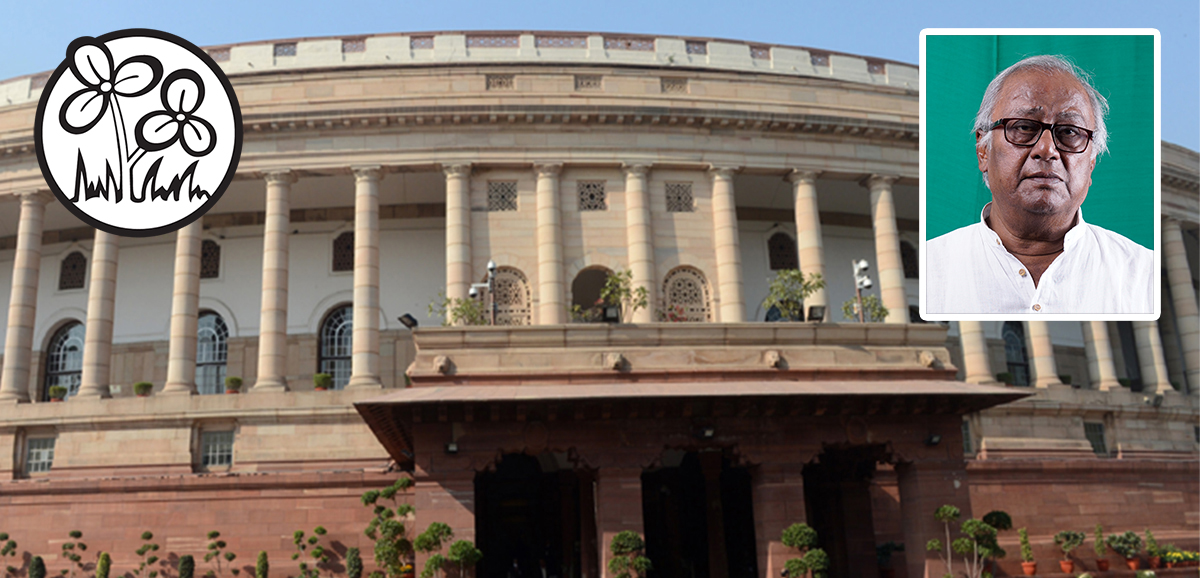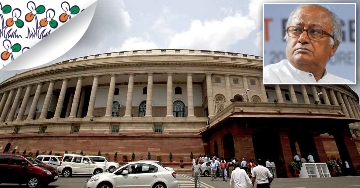Namaskar Sir, thank you.
I rise to speak on the Delhi genocide. I am not speaking in a happy frame of mind because the Delhi genocide happened 72 years after Gandhi ji was murdered in the same city by a Hindu fanatic. Gandhi ji has been murdered again in Delhi by you know who, Sir.
Sir, I was listening to one of the Honourable Members. Her speech, if made outside, could be termed as a hate speech. I have seldom heard such a biased, communal speech. I do not know whether this should go up in the House records. The Member was forthright in her defence of a man who went to Maujpur with 300 people and started the riots. She spent five minutes defending the most hated man so may I quote Shakespeare and call her ‘the devil’s advocate’. She is the best devil’s advocate possible. She has also been an advocate for Delhi Police, which has shown total inaction and ineptitude in this whole riot in Delhi. Unfortunately, there are not many takers for Meenakshi ji’s speech.
Sir, this is what our leader Mamata Banerjee has said, that the Delhi riots were “a planned genocide”. So I must explain why she described it as such. She called it “a planned genocide” because there was gradual build-up to the hatred that led to the riots. First, there was the action taken in JNU against the students. Then, the police went to the Jamia Millia Islamia University and beat up students inside the library. Then, one after another, in the run-up to the Delhi election, one person said, “Goli maro”, and used some other words. Then another said, regarding the Shaheen Bagh protesters, that people will go and do all sorts of things to them. Then the Honourable Home Minister said, “Aap itna zor button dabao ki Shaheen Bagh mein current lage”. Lekin unka baat koi nahi suna, party haar gaya, woh toh dusri baat hain. But he did say, “Itna zor button dabao ki Shaheen Bagh mein current lage”. The hate was being built up, and then this man Kapil Mishra openly said that if the road was not cleared, he shall go with 300 people to clear it up.
Then what happened, Sir? I’m not counting Hindus and Muslims, because I quote John Donne, who said: “any man’s death diminishes me,/ because I am involved in mankind./ And therefore never send to know for whom/ the bell tolls; it tolls for thee”. This was quoted by Ernest Hemingway in his famous novel, For Whom the Bell Tolls. Sir, I am not counting though I know that out of the 53 people killed, there were two policemen, and 11 belonged to the majority community and 40 to the minority community. I am not naming any community but it’s obvious that the minority community suffered more. And what’s more, thousands of people have fled from the affected areas and gone to their villages in Uttar Pradesh and Haryana, or are living with relatives elsewhere in Delhi.
In this city of Delhi, areas like Maujpur, Chand Bagh and Jamuna Vihar were wholly affected. The other areas wholly affected, if I may mention, were Jaffrabad, Seelampur, Babarpur, Gokulpuri, Khajuri Khas, Karawal Nagar, Bhajanpura, Maujpur and Shivpuri. For three days, there was a naked dance of communalism in the streets of Delhi. How did it start? On the 23rd, Kapil Mishra came with a pro-CAA procession and there was a meeting in Jaffrabad. First, a clash took place between pro-CAA and anti-CAA protestors. Women have been sitting at Shaheen Bagh since December 14 but there was no violence. However, BJP leaders kept instigating them, saying “Yeh Shaheen Bagh, yeh deshdrohi hai, isko goli maro, ura do”, aur yeh ghrina charo taraf failne laga. Yahan Meenakshi Lekhi ka jo speech tha, waisa hi sab speech log bahar mein de rahe the.
On the 23rd and 24th, the actual rioting started. I was looking for our Honourable Home Minister, and I saw him sitting in a front row sitting in the front row at Motera Stadium welcoming Mr Trump. When he should have been in the police control room he was welcoming Mr trump at Motera. On the 24th, which was a Monday, Mr Trump came to Ahmedabad and then he undertook a romantic visit to Agra, and our Home Minister attended Motera and came back to Delhi, but there was no order for the police. On that day, five people were killed including one head constable Ratan Lal. The violence was escalating, but still there was no clear instruction from the Honourable Home Minister. He was busy at Trump’s meeting. Then on the 25th things went out of control. Armed mobs fought with each other on the streets of Delhi. As the Honourable Member referred to earlier said, Molotov cocktails, stones, bombs and other things were thrown, and ultimately the death toll has gone up to 53. The Honourable Home Minister then had a meeting with the Chief MInister of Delhi and others on the 25th – mind you, not on the 24th when the riots started. He had the meeting on the 25th. And only on the evening of the 25th were the first orders given for imposition of Section 144 and for shoot-at-sight. Still, the violence went on throughout the night of 25th. Only on the 26th did peace return. The police had taken some action. The useless commissioner of Delhi was removed and a new man was brought in.
Now it has been questioned as to why did the NSA visit these affected areas on the 26th? What was the Home Minister doing? The NSA is supposed to keep track of the threats to the country. But he is going to Kashmir, he is going here and there. Is it his business to control the internal law and order situation? Why was the Home Minister absent from action? There was no explanation for the same.
When Ajit Doval went, he said, “Jo ho gaya so ho gaya, now there will be peace”. Uske baad se mera ek kavita yaad aya — “Panchi jo udti hai chaman badal giya/.Haste hai sitare gagan badal giya”. Aj shanti, khamoshi bata rahi hai laash wohi hai sirf kafan badal gaya. Kafan badal gaya kyun ki Ahmedabad wapas aya. Sir, Naroda Patia wapas aya; we haven’t forgotten. But the now Honourable Prime Minister said in 2002, “To every action there is an equal and opposite reaction”, quoting Isaac Newton.
At this stage, I feel bad standing face-to-face with the Honourable Home Minister. You are still young, you have a good future if you accept responsibility for your failure to control Delhi riots, if you acknowledge your responsibility for failing to bring peace within three days. You were busy with Trump, so you could not do it. Acknowledge the responsibility in the name of god and go, don’t sit in the Home Minister’s position. If you go now, maybe you will recover, otherwise you will have to lead the rest of your life with the stamp on your forehead that this is the man who could not prevent the riots in Delhi, just 10 km from the Home Ministry’s headquarters. If you could not control Delhi, how would you control this huge country?
Sir, I demand a judicial enquiry into the riots by a sitting Supreme Court judge, not a retired judge. I demand total rehabilitation for all those affected by the riots, and lastly, with all politeness at my disposal, I ask the Honourable Home MInister, in the name of god, to go.


